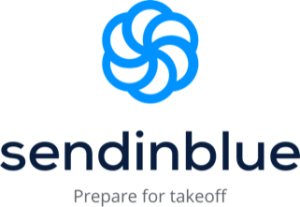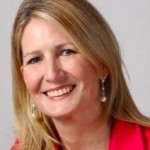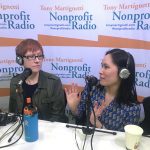
My Guests:
Hannah Thomas & Morgan Fletcher: Movement Messaging
Expanding on the partnership theme two weeks ago, consider building a movement with orgs outside your direct mission. You’ll want cohesive, effective messaging and that’s where Hannah Thomas and Morgan Fletcher can help. Hannah is with Big Duck and Morgan is at Girls for Gender Equity. This is part of our 21NTC coverage.


Maria Semple: Farewell, Maria Semple

Her first Nonprofit Radio was February 11, 2011. Soon after she became our prospect research contributor. Maria’s practice has evolved and this is her last show. Quoting somebody, nobody can identify: “Don’t cry because it’s over; smile because it happened.”
Listen to the podcast
Podcast: Play in new window | Download
Get Nonprofit Radio insider alerts!
I love our sponsors!
![]() Turn Two Communications: PR and content for nonprofits. Your story is our mission.
Turn Two Communications: PR and content for nonprofits. Your story is our mission.
Sendinblue: The only all-in-one digital marketing platform empowering nonprofits to grow.
We’re the #1 Podcast for Nonprofits, With 13,000+ Weekly Listeners
Board relations. Fundraising. Volunteer management. Prospect research. Legal compliance. Accounting. Finance. Investments. Donor relations. Public relations. Marketing. Technology. Social media.
Every nonprofit struggles with these issues. Big nonprofits hire experts. The other 95% listen to Tony Martignetti Nonprofit Radio. Trusted experts and leading thinkers join me each week to tackle the tough issues. If you have big dreams but a small budget, you have a home at Tony Martignetti Nonprofit Radio.
View Full Transcript
Processed on: 2021-06-19T14:50:15.009Z
S3 bucket containing transcription results: transcript.results
Link to bucket: s3.console.aws.amazon.com/s3/buckets/transcript.results
Path to JSON: 2021…06…546_tony_martignetti_nonprofit_radio_20210621.mp3.395782980.json
Path to text: transcripts/2021/06/546_tony_martignetti_nonprofit_radio_20210621.txt
[00:00:11.24] spk_4:
Hello and welcome to tony-martignetti non profit radio big
non profit ideas for [00:01:51.04] spk_6:
The other 95%. I’m your aptly named host of your favorite abdominal podcast. Oh, I’m glad you’re with me. I’d be hit with hyper nutri mia if you shared the salty idea that you missed this week’s show movement messaging, expanding on the partnership theme two weeks ago, consider building a movement with org’s outside your direct mission. You’ll want cohesive effective messaging and that’s where Hannah thomas and morgan fletcher can help Hannah is with big duck and morgan is at girls for gender equity. This is part of our 21 NTC coverage and farewell Maria Semple Her first nonprofit radio was February 11, Soon after she became our prospect research contributor, Maria’s practice has evolved and this is her last show quoting somebody nobody can identify, don’t cry because it’s over smile because it happened. tony state too podcast pleasantries were sponsored by turn to communications. Pr and content for nonprofits. Your story is their mission turn hyphen two dot c o and by sending blue the only all in one digital marketing platform empowering non profits to grow. tony-dot-M.A.-slash-Pursuant in blue. Let’s get started. Shall we hear is movement [00:01:54.62] spk_2:
messaging. [00:02:11.74] spk_5:
Welcome to tony-martignetti non profit radio coverage of 21 MTC. The 2021 nonprofit technology conference. We’re sponsored at 21. NTC by turn to communications turn hyphen two dot c O. My guests [00:02:12.42] spk_2:
now are Hannah, thomas [00:02:23.64] spk_5:
senior strategist at big duck and morgan fletcher, Director of marketing and storytelling at girls for gender equity. Hello morgan welcome. [00:02:26.44] spk_3:
Hey, tony excited to be here, [00:02:28.51] spk_1:
I. tony Thank [00:02:33.64] spk_5:
you. Pleasure to have you on nonprofit radio and our coverage of the 21 MTC uh your [00:02:36.68] spk_2:
session topic [00:02:41.24] spk_5:
is me versus we. Well, we versus me. We versus me. [00:02:42.60] spk_2:
Maybe it makes a difference. [00:02:55.04] spk_5:
We’ll find out if it makes a difference, but we’ll get it correct. We versus me Building messaging for a movement. Hannah, would you get us started with with some basics? What is this movement messaging that we are talking about? [00:02:58.54] spk_3:
Yeah, I’d love to start us off with that. Um, so to set some context in the nonprofit landscape over the [00:03:05.49] spk_1:
last few years, there’s [00:03:38.34] spk_3:
been a lot of efforts made by nonprofits to band together in coalition to work in partnership um in in service of movements that exist beyond even just the organization’s mission. Um, so those are causes that are benefiting the collective sector, benefiting the larger world. Um and they really require a different take on messaging. A lot of times, nonprofits are very focused on clearly articulating themselves in their mission and making sure their audiences are really motivated to support them. But movement messaging in order to be effective, has to be used by multiple voices, multiple entities, um and move a bunch of different audiences to take action in support of a larger cause. Um So where when we’re talking about movement messaging, we’re talking about sort of a reframing um from me to we so that that sort of explains the title there. [00:04:16.24] spk_5:
Okay, So we we versus me is Okay or Me versus we is okay, but we’re going to go from me to we Exactly not. We to me, that’s the opposite of what we’re trying to do. All right. That would be taking a great cause and distilling it down to uh were the center of the universe, and we’re the only ones who can do this work. So the rest of you are out exactly [00:04:19.01] spk_3:
opposite. [00:04:48.54] spk_5:
That’s exactly what we’re not doing, right? That’s antithetical to what we’re talking about. Okay. All right, um, morgan. Let’s bring you in. Let’s help us understand what the value is of working outside our mission. Because I I want to I’m thinking of our listeners. You know, they they’re they’re tied up in their work and I want them to help or I want to help you to help them see the benefit of seeing outside your own individual mission to a broader cause. So what what what was the experience that girls for gender equity? [00:06:34.84] spk_1:
Yeah, for sure. So it goes for gender equity and we call ourselves G for short, just as context for who we are. An intergenerational organization based in Brooklyn. Um, that’s centering black cis gender and transgender girls and gender non conforming non binary youth of color in the fight for gender and racial justice. So with the mission statement like that obviously actually is quite broad, which allows us a lot of opportunity to partner and collaborate with organizations who are able to meet us at the intersections of the lived experiences of the young people that were working with. So, for example, Environmental justice, economic justice, all these other issues are also racial justice issues. And so we have a lot of entry points to our work, particularly for this session with Hannah. We I was speaking about a national agenda for black girls, which is G. S. First national campaign that we launched in alignment with the presidential election. Keeping in mind that we were always trying to center young people of diverse backgrounds but of color To help us shift policy priorities and have them actually be informed by people who need the change in their lives. So there are plenty of organizations that we partnered with in this work. We had about 60 endorsing organizations. And the campaign itself is spearheaded by a steering committee of 80 young people from across the country and they each represent their own organizations that are local. So we’re able to work collaboratively with these organizations that may be may fall under the umbrella of what we’re talking about, right, these intersectional areas of young people’s experiences, but they may not be, you know, exactly cookie cutter like girls for gender equity, but the issues that we’re talking about are in alignment with theirs. And so we’re able to develop strong messaging that all of the organizations collaborating with us can uplift and use and take action on [00:07:01.14] spk_5:
any. Was there any consternation at G about working in broader coalitions and and excuse me, maybe, you know, diluting some of our own work, you know, were there any? Was there any pushback like in the organization? May be among the board? Just you know, I’m trying to help people see what what obstacles might be might be out there for them to do this [00:08:36.54] spk_1:
work? Absolutely, yeah. Did you have any of that? We were very fortunate. I will say that um we had a really good base of organizations that we were used to collaborating with in this way who were aligned with our values? Already newer organizations of course came in and um, you know, did a gut check with us and had we had internal conversations and we hold we hold regular meetings for those folks as well as we kind of catch them up on where our messaging is coming from to continue to check that we are still in alignment and with our priorities and framing. But I would say that actually the place where we experience the most challenge and growth as an organization and as a campaign running team was in the messaging around identity. You know, you heard me list a couple of different gender presentations and identity that one might claim moving through this world and for us, especially as we’re co collaborate and co designing this campaign with the young people in the steering committee. We had a lot of conversations around like, well honestly, who’s a black girl? Why are we framing it this way? Do we, you know, how expensive is this terminology? And does it accurately represent? Do people who are on this campaign feel accurately represented by this language? So I would say that a lot not a lot of but most of the pushback that we were receiving was extremely useful because it was coming from young people themselves who were saying, you know, I’m not binary, I don’t love that, this is framed this way. And I’m like, as you know, as a person who’s in charge of the frame and like great, keep giving me that feedback, right? Let’s create a campaign that actually represents you and how you’re moving through this world. That’s the point. So I would say a lot of constantly having that dialogue so we can continue to make sure that the campaign is serving the people, it’s intending to serve. [00:08:50.34] spk_5:
I have to broaden my mind because when I got if I if I were getting that kind of feedback that you gotta be like, this is so annoying, why can’t you just agree with what we all we all the rest of us agreed on. Why can’t you just jump on board what you have to cause [00:08:58.25] spk_2:
trouble? So [00:08:59.49] spk_1:
it makes it a really time consuming [00:09:22.44] spk_5:
process. It’s frustrating, but you always frustration usually leads to a better place. I mean if it’s channeled right, you know it’s unproductive than then it’s destructive but you know in creativity I found that frustration usually leads to a better a better outcome. Alright let’s go back to you now. So take a little broader Hannah help us identify like what, how does Big Duck think of a movement? What’s a what’s a movement? [00:09:56.44] spk_3:
Yeah. I think um actually really related to what you’re just talking about, the language, the definitions, all of this stuff is you know always evolving and all we were always adapting what we think about as a movement and the role that messaging can play in that. Um But generally a big duck. We’re thinking about a movement as the commitment of many to work together and create transformative change based on a shared purpose or goal. And we see movement [00:09:57.55] spk_5:
any. I’m distilling that down to uh many, working on a shared purpose or goal. [00:10:04.27] spk_3:
That’s right towards transformative change. [00:10:26.54] spk_5:
Okay, Okay. And how about um the messaging? How do you conceive of the messaging? And then we’re gonna we’re gonna have to dive in and explain how we how we all work together to ally around a common message, but help us understand. I mean, are we just talking about the simple it’s just a simple communications. The what each of us produce. [00:10:41.34] spk_3:
Yeah, we are talking about, you know, all of the different ways that you can communicate something to an audience and try and prompt them or motivate them to take action with you. And so that can be, you know, in a tweet, that can be all different sorts of ways that you can communicate out. That can be in the stories that you tell, the narratives that you’re trying to disrupt or push forward. Um there’s a lot of different ways that you can that can be at a rally when somebody is giving a speech, what’s being said there in that context. Um so we’re really thinking big big about what what messaging can look like and trying not to have a narrower prescriptive view. [00:11:34.74] spk_5:
Okay, so yeah, whatever channels, whatever channels you have, and then does does each well, before we get to approval, like getting messaging approved? So, I don’t know, we’ll talk about that process if it’s even necessary. But how do you how do you start to bring folks together, around around a common message with, you know, inclusivity? And uh you just just convene a meeting and then you start somebody produce a document that everybody comments on it. [00:11:38.16] spk_2:
How does this process work? [00:11:41.54] spk_1:
Yeah, I would [00:12:56.94] spk_3:
say that there’s probably a lot of different processes that work. Um but we found that helpful like in um to to align yourself with other organizations, other people, individuals who are would be aligned around a common cause is too start the conversation around shared values. Um and the opportunity agenda is obviously a great resource, doing a lot of work around storytelling using values and all that, but shared values are really an effective in for folks who wouldn’t otherwise get the nitty gritty of of what you’re trying to achieve, to understand their role in your cause and understand how it relates to their own. Um So we we talked about in our session all of the different ways that you can like sort of frame frame this cause in ways that use those deep shared values and also you know, fill in the context around that. Um So you know, we all believe in love. Um, so or we all believe in opportunity. Um, so maybe that’s an effective in for somebody, an organization who back in the day was advocating for a gay marriage, right? There was a lot of that was a great example at the time, actually, of the way that shared values were a really efficient, effective way for people to move hearts and minds, um, and to gather, you know, some momentum around this cause that on the surface, on the policy level folks weren’t really jelling with. [00:13:11.64] spk_5:
That’s a great example. Yeah. Love who’s gonna disagree with that? [00:13:15.74] spk_1:
Exactly, [00:13:16.39] spk_3:
literally no one [00:13:17.43] spk_5:
I’m the I’m the anti Love, I’m the anti Love [00:13:21.16] spk_1:
candidate, tough to make [00:13:24.26] spk_5:
not in favor of that. [00:13:25.21] spk_2:
Yeah, that’s my platform [00:13:26.50] spk_6:
is uh is hate, right? [00:13:57.74] spk_5:
Well, there are people who have that, but they don’t call it that. Um even they would say that we I agree with Love. We agree with Love. Alright. So cool. All right. All right. Um And then it’s starting to frame these messages like you said, I’m kind of in the details, like So then All right. So, we have these shared values morgan. How do we start to build messaging? We just want to share documents that uh people start contributing to. [00:14:00.23] spk_2:
How did that work? [00:14:54.74] spk_1:
Yes, the process. Well, for us, honestly, it’s it really is that fundamental basic, just kind of like, look, let’s just start putting some things down. Of course, there’s all sorts of like jazzy processes you could design and do all sorts of like discovery conversations and, you know, you can call it by those names and that is what it is. But I think ultimately we really did just sit down as a team internal and lay out our vision as it aligned with, of course, the larger goals of the organization, because this was specific to a campaign, but this applies to all of our work. We sit down as a team, we pull out a document, um, and this was developed in the time where we could be in person at our office, so we were able to sit down together in a white board, technically, and put everything down, and then we started to introduce that to people that we thought would be great allies in the work. And so we had our entry points at each organization, based on people we knew through our connections personally. Um, and also just kind of put out a general call to action into these organizing spaces that we knew had similar values alignment or values alignment, and similar ideas about a progressive future for black girls. So we could run with that. So it really wasn’t. It really was a lot of google documents. Honestly. [00:15:22.54] spk_5:
All right. So, so morgan did you have a formal organization that that you all created or this just like this? You didn’t make a legal organization out of all these entities? Right. You just you just all contributed to a campaign, [00:15:50.34] spk_1:
correct? So we remained Girls for gender equity. And we launched a national agenda as an initiative of Girls for gender equity. Within that. We do have a steering committee, as I mentioned, that young people and then we also have the partner organizations who are represented by those young people and some who are not who are partners in the work at large. And so those things, those groups all have names, but we did not go about formalizing legally a new entity. [00:16:05.74] spk_5:
Okay, Okay. Not necessary. Um, and so while this is going on, uh well, this larger campaign is going on, you’re still doing your own, your own messaging, Right, Aggie. You know, that’s not like that suspended or anything. [00:16:12.21] spk_1:
No, definitely still definitely juggling both. Right. All right. [00:16:17.84] spk_5:
And and how does how is fundraising impacted? Was was part of the campaign for fundraising for the for the entities or it was it was a different a different call to action? [00:17:33.74] spk_1:
Yeah, fundraising is certainly call to action for national agenda specifically because it has its own funding. And so, you know, we’re fundraising for G were fundraising for a national agenda. And of course we are talking about G. I mean, we do narrative shift work, we do direct service work. We also do organizing policy campaigns work. So there are several different buckets of work that were fundraising for at any time. Um, I think what our process has been to keeping that streamlined for and under comprehensive and clear for our audiences is just naming, but in very clear, consistent terms, all of what we’re holding as best we can and acknowledging that it’s a lot and that allows us to lean into this the, you know, what, what Hannah and I were talking about before around intersectionality and the holistic nous of the work and the holistic nous of the movement work. Right? So we can say we’ve been very explicit about a national agenda is focusing on these national priorities. However, at a city and state level in new york where we’re based, this is what else we’re holding and how it is interlaced with these other priorities. And so we’re able to flesh out where all these things are meeting and also naming, you know, there you can choose to support any of these, but ultimately supporting us will support all of them. [00:18:01.14] spk_5:
Hannah, help us understand some more around the the complexities of messaging and consistent messaging or maybe maybe have some big some best practices that Big Duck or something. Help us flush out the details of getting consistent messaging across all your, all the entities contributing to well, in morgan’s cases with the national agenda, but you know, whatever, whatever cause we might be working toward. [00:18:46.14] spk_3:
Yeah, I think it’s really interesting because at Big Duck primarily were preaching, you need to have one voice, a very consistent voice, a very aligned voice. Everybody should be a brand ambassador who understands deeply what you’re positioning is, what your personality is, should be able to speak. You know, all you know, sounding the same with movements. I think it’s actually very different. I think you have to necessarily make space for people to communicate. The message is in their own way using their own personalities. Um the movement can’t it’s really in my view like an exercise in relinquishing control in a lot of ways and making sure that it’s it’s something that others can own as well and feel like it’s theirs to speak about in their own voice. [00:19:01.14] spk_5:
It’s interesting like nobody owns it, but everybody, everybody owns it, but nobody owns it. [00:19:53.94] spk_3:
Exactly. And that’s why you can see a lot of um successful movements. One that I think is really cool is the land back movement and campaign. So there are website is very simple and it has a manifesto with about 10 lines of text on it about all the different meanings that land back has in terms of a literal, you know, meaning of we want to get this land back. But also the narrative, this means about our relation to our relationship to the environment, our relationship to racial justice, all of these different things. So it sort of sets up a basic something to work with. But if you look at the hashtag land back on instagram or something like that, there are so many folks, so many individuals who are able to um build meaning from that from that manifesto and take it in new directions and give it new life all sort of aligned generally around that manifesto, but really expanding um expanding the meaning. [00:20:12.04] spk_5:
Anything either of you want to want to say about this sort of this consistent shared messaging [00:20:15.14] spk_2:
Before we uh [00:20:16.47] spk_5:
before we move on, morgan you’re shaking your head. You want to add some more. [00:20:39.84] spk_1:
Yeah, I just wanted to underscore I think how important it is for there to be a muscle for constant vulnerability, openness to feedback and collaboration. Um you know, campaigns as Hannah was saying, you know, folks are able to step into the campaign work individuals and organizations and make it their own in a way and that is so special and unique and you also want to be sure that that does not spiral into another direction of course. And so you want to also provide structure and infrastructure for folks to feel supported as they’re moving with this campaign. Right? [00:20:54.54] spk_5:
Like what? Like what kind of structure and infrastructure? [00:20:56.94] spk_1:
Yeah, So I would say, you know, developing really basic tools that people can use, like messaging, kids digital tool kits to provide folks with key talking points graphics, if you want there to be visual cohesion to your campaign and folks don’t always use that stuff, you know, of course they’re like, that doesn’t match individuals might be like, doesn’t match my aesthetic organizations might be like, you know, we want to frame it a little differently. So the intersection with our work is more cohesive and clear to our audiences, but you want to give folks a starting point so they can say, you know, I like looking at land, land backs manifesto, they can refer to some tools and documents and say, okay, I know where this is rooted. And I’m going to pull these pieces from it for my, my specific messaging or my organization specific messaging and then having consistent checking with folks, you know, updating that regularly, letting folks know it’s being updated, these real basic communications that get lost because you’re holding so much. [00:22:09.24] spk_5:
Do you feel like giving Tuesday is an example of what we’re talking about, or like spun large, you know, billions of dollars now? Or is that really something, something different because it’s so decentralized? I mean we’re talking about something decentralized here, like I said everybody owns it but nobody owns it, but I don’t know do you feel like giving Tuesday is an example of could be an example large of what we’re talking about or or no, that’s really something different. [00:22:46.74] spk_1:
I think so, especially to disagree with me and say something. No, I was thinking about it, you know, I think um I mean we’re talking specifically about very progressive movements. I certainly am, but I’m thinking about how they, you know, they really provide, we are obviously participating giving Tuesday um and they always provide such incredible materials. So you you feel so clear through the process. Okay, I’ve got 44 months, six months out. How do I build this campaign around this moment? Right. And I always feel so prepared for giving Tuesday because they’re able to roll out such robust materials to build that infrastructure for us as organizations. [00:23:08.04] spk_5:
Alright, well, there’s at least lessons to take from giving Tuesday in terms of the support you mentioned, support infrastructure. Um one of the things that you mentioned in your session description Hannah is that you want folks to reconsider some best practices that may be hindering their cause. What does that mean? [00:23:09.14] spk_1:
Yeah, [00:24:37.94] spk_3:
we, we hit on some of it earlier when we’re talking about intersectionality and making space for, you know, other causes or things that are not directly in your lane, but maybe in the next lane over. Um I wanted to include say this Audrey Lorde quote. There’s no such thing as a single issue struggle because we do not live single issue lives. So if you are an environmental organization, but you don’t see how that could connect to racial justice or to voting rights or to whatever else may be out there. You’re missing some great opportunities to expose, you know, that there’s critical connections between all that we’re doing and it can be really hard. That’s the me versus we inaction is like I need these dollars, I need these donors, I need the spotlight all of that versus a different mindset, which which we think of as a scarcity versus abundance mindset. Um, so what I was just explaining is an example of some scarcity thinking versus we want to spotlight this whole ecosystem of change we’ve got going on of which we are a piece. Um, there’s room to show how we’re connected to what our peers are doing. There’s enough dollars and donors to go around. It doesn’t have to be us who gets all 50 of those donors dollars. Maybe they give us five, and they give everybody else five to um and again, a de emphasis maybe on dollars, right? Folks have currency that goes outside of, you know, money. And how are you showing value for that? So, a lot of ways of like kind of de centering your organization in a healthy and healthy and productive way. So that’s one example of disrupting sort of best practices that we think about [00:24:56.44] spk_5:
it. And that’s related to what you had said earlier about surrendering control. The point that nobody owns [00:24:58.78] spk_2:
this. [00:25:07.54] spk_5:
You have another one. That’s that’s very good de centering. Right? What else? Another another sort of mind shift that you want to encourage? [00:25:38.44] spk_3:
Yeah, we had a whole section where we were talking about disrupting um dominant narratives, which I think morgan can speak to a little bit more. But dominant narratives are these sort of pervasive, like, the way we say things are the way we tell things, and the things that we assume that we are are all really sharing um movements are a great opportunity to really disrupt that and and form new narratives um that are healthier and that are um more progressive and are gonna frankly help us transform the world in the way we want to, I don’t know, morgan if you wanted to chime in. [00:27:14.74] spk_1:
Yeah, I would just add as, like, a specific example, um you know, for us, when we’re talking about when G is talking about are the constituents in our programs and young people who are in our campaigns, You know, a lot of the work that we do is around shifting the narrative around the your audience cannot see this or cannot hear this or see it, but I’m using air quotes when I talk about the monolithic black girl, right? Like this and no community is monolithic, this is it. This means nothing, right? So what are you know, for us to break down that absurd premise? Um it requires us to really give opportunity to young people in our programs um to tell their unique story as they want to tell it. And so for us, our narrative shifting work looks like passing the mic. It’s not about me, the director of marketing storytelling, going to a rally and giving a really great speech. You know, it’s about young people going to that rally and them giving great speeches or speak in front of city council in new york, which we do quite frequently or talking to legislators across the country. You know, other types of campaigns that we’re building out right now. Video and social media storytelling campaigns that really allow us to present a breath of experiences and all those people are saying I fall somewhere on this black girlhood spectrum, This identity spectrum and my story may not look like this young person or that person or that person, but it is still important, it is still affected by the legislation that’s happening in this country and therefore it’s still relevant. Okay, I have [00:27:16.64] spk_5:
a little uh, we’re going on in the background. I don’t know if you can hear that buzz, so yes, you can. [00:27:24.44] spk_2:
Okay, sorry. Um All right, um [00:27:30.64] spk_5:
let’s let’s leave it there. But Hannah, why don’t you just take us out with some last minute motivation? I I can see ego has to be, you know, checked at the door. You know, we’ve been talking about decentralization, de centering yourself and and your organization. Um so yeah, Hannah leave us with some last last, second last minute motivation. [00:28:31.14] spk_3:
I have the perfect way to close this out and this is what we close our our presentation with was how important the role of a radical imagination is in helping develop movement messaging and helping you create that story that you want to tell and move folks towards action. I think it has taken a paraphrasing Adrian Marie Brown, who um wrote an emergent strategy, how it took somebody else’s imagination for this world that we have right now to come to fruition right for all of these structures and all of everything going on to happen. And we need to use our imagination if we want to create something different. And I think that if nowhere else that really radical imagination that proud, you know, proclamation of a future that we’re going to get to really belongs in movement messaging. Um so it’s more of an abstract ending note, but really important to use your imagination and be sharing, sharing your vision for the future. Unapologetically, [00:28:51.74] spk_5:
that’s Hannah thomas, senior strategist at Big Duck also was morgan fletcher director of marketing and storytelling. A. G girls for gender equity, Hannah morgan, thank you both very much. Thanks so much. [00:29:01.66] spk_3:
Thank you. Thanks tony [00:29:13.64] spk_5:
Glad to have you and thank you for being with tony-martignetti non profit radio coverage of 21. Ntc we’re sponsored by turn to communications turn hyphen two [00:29:15.01] spk_2:
dot C o. [00:30:36.54] spk_6:
It’s time for a break. Turn to communications, you remember them, The Chronicle of philanthropy, the new york times, The Wall Street Journal, Usa today stanford Social Innovation review Oh, the Washington Post the Hill Cranes, nonprofit quarterly Forbes Market Watch. That’s where turn to clients have gotten exposure. You want that kind of press turn hyphen two dot c o. Your story is their mission. It’s time for Tony to take to the pleasantries, the podcast pleasantries have to come out. They haven’t been for some time. They’ve been dormant. They’ve been on hiatus for several weeks, but they’re back pleasantries to our podcast audience. U 13,000 plus listeners throughout the world. We’ve got listeners, yeah, we’ve got listeners in Germany um, where else besides north America? Certainly north America, we’ve got Canada and Mexico covered. Uh, so those go without saying not, not that we take the, not that we take the northern and southern neighbor listeners for granted. No, no, no, but they’re, they’re, it’s, it’s just kind of understood, you know, it’s, it’s tony-martignetti non profit radio [00:30:40.45] spk_2:
You just know that [00:30:56.64] spk_6:
all the north american countries are going to be represented. It’s, it’s just, it’s subsumed in the name. That’s that’s, that’s what it is. That that that’s what I mean to say. It’s subsumed. So we’ve got North America covered that. Subsumed going [00:30:56.94] spk_2:
abroad. Oh, [00:30:58.03] spk_5:
Germany. [00:30:59.56] spk_2:
Um often checking [00:32:42.74] spk_6:
in uh, italy France UK, certainly o u k. Those are the ones that come to mind and if you’re out there in other countries beyond those just named, let me know. I’d love to shut you out. Love to the pleasantries. The pleasantries. I’m grateful. I am grateful that you listen two nonprofit radio week after week. I’m glad the show brings you value. I hope it gives you actionable steps or things you can start thinking about to lead to action. That that’s what this is about. Right? So the pleasantries to you, our many, many podcast listeners, I’m grateful. That is Tony’s take two send in blue. It’s an all in one digital marketing platform with tools to build end to end digital campaigns that look professional are affordable and keep you organized. They do digital campaign marketing, that’s what we’re talking about. Most marketing software is designed for big companies and has enterprise level price tags. No, no, not here, sending blue’s price for nonprofits, it’s an easy to use marketing platform. They walk you through the steps of building a campaign. You want to try them out and get a free month, send him blue. Hit the listener landing page at tony dot M A slash send in blue. We’ve got boo koo but loads more time for nonprofit radio Here is a farewell Maria Semple. [00:32:46.74] spk_5:
It always has been my pleasure to welcome Maria simple to the show. Of course, [00:32:52.15] spk_2:
month after month, year after [00:32:53.54] spk_5:
year, many years. [00:32:55.24] spk_6:
Uh, today it’s [00:32:58.54] spk_5:
uh bittersweet to welcome Maria sample back to nonprofit [00:33:04.74] spk_2:
radio for a farewell. You know her, she is the prospect [00:33:06.98] spk_5:
finder, a trainer and speaker on prospect research. [00:33:10.36] spk_2:
Her latest book is [00:33:11.28] spk_5:
magnify your business tips tools and strategies [00:33:17.84] spk_2:
for growing your business or your non profit she’s are dyin of dirt cheap and free. [00:33:28.24] spk_5:
She has been for many years, she’s at the prospect finder dot com and at Maria Semple, I always used to [00:33:29.06] spk_2:
say Maria, it’s a pleasure to welcome you back. It’s a little like I said bittersweet this time though, [00:33:33.71] spk_5:
hello, hello and well you’re still welcome. You’re still very welcome. It’s just not so much of a pleasure that’s [00:33:57.34] spk_0:
all. Uh, well thank you for having me back for a little bit of a farewell and you’re right, Tony. It is bitter sweet. Um, you know you and I have been talking in one way or another and having it recorded before the time of internet radio, we were doing some tele recordings, right? We would do recorded calls and that’s right. We had those phone [00:34:01.68] spk_2:
calls. Tell us we did a few tele calls together about planned giving and prospect research. Yes, [00:34:07.31] spk_0:
yeah. Yeah. Back back in the day when it was tele classes. Right. [00:34:11.52] spk_6:
Right. [00:34:12.44] spk_2:
Yeah. [00:34:13.29] spk_5:
Yes. And then we [00:34:14.47] spk_2:
did some, some conferences together. [00:34:16.88] spk_5:
That’s right. [00:34:17.70] spk_2:
Prospect [00:34:29.34] spk_5:
research and planned giving. Um, and then it’s been many years on, on nonprofit radio you, it’s been like eight years or so. You’ve been with the show. [00:34:30.32] spk_0:
Absolutely prospect [00:34:31.99] spk_2:
research contributor. [00:34:33.05] spk_5:
What’s [00:34:33.91] spk_2:
going on? What’s going on in your professional life? [00:36:18.53] spk_0:
Well, you know, my business, you know, in the last couple of years has expanded and, and uh, focused a little bit more, you know, like the title of my book Magnify Your Business. It’s really kind of focused a little more on online marketing, strategy, social media, email marketing linkedin and really um you know, expanding to beyond nonprofits as well. So I work with a lot of small businesses and financial advisors. Um and and I’ve been, you know, I pulled back a little bit, I’ve been, you know, having moved to uh beautiful crystal coast of north Carolina. I’ve been working more part time than full time as I was back in New Jersey. Um and I’m doing a ton of volunteering for a number of different organizations and capacities. And one of the most recent projects that I’m really excited about is expanding broadband. And you know, that’s a big topic right now, coincidentally, so last year I was invited to serve on a committee here in carter County to expand broadband opportunity um in underserved and not served at all regions believe it or not, there are pockets down east and so forth. They just don’t have any internet. Um, and so we saw in the last year how important it was to be able to stay connected. Um, and so through the carter at County Economic Development Foundation, um, I’m continue to serve on a committee that’s going to now be implementing some of the deficiencies in areas that were identified in the digital digital inclusion report, um, that that came out. So that’s one of the big projects. [00:36:40.43] spk_5:
So you’re working more part time and that means you’re not going to be contributing prospect research wisdom as our deutschland of dirt, cheap and free on nonprofit radio So your, your focus is shifted [00:36:46.61] spk_2:
a little more, [00:37:02.03] spk_5:
little more business oriented, only part time, a lot of volunteer work, which I love because we only live 12 miles apart about so uh, helping you’re helping my community to, uh, we’re in the same county. Um All right. I [00:37:02.74] spk_2:
understand that, [00:37:04.34] spk_5:
so happy to hear it, but I understand [00:37:07.83] spk_0:
and I’m serving as my H. O. A. Board president. Uh [00:37:12.82] spk_5:
I hate H. O. S. Oh my God when I moved here uh Homeowners [00:37:18.39] spk_2:
associations. [00:37:22.83] spk_5:
Yeah. So your uh your those people who say you can’t you can’t put this color on your door and you can’t hang this on your windows at christmas time. Is that you? [00:37:30.13] spk_0:
Unfortunately. Unfortunately I I didn’t I unfortunately. Yes, there are there are rules when you live in an H. O. A. Community, so either you live in one or you don’t. [00:37:43.53] spk_2:
Alright, alright. I don’t mean you’re the president, [00:37:47.73] spk_5:
you’re going to be the scrooge time, your lights are too bright or whatever. You [00:37:52.75] spk_0:
know, we don’t get into lighting because it’s all common area lighting. It’s a condo complex. It’s not single family homes. [00:38:00.42] spk_5:
Right. Right. Well, people can outline their windows with christmas lights or something. We [00:38:04.94] spk_0:
allow that. That’s fine. [00:38:06.72] spk_5:
Okay. [00:38:08.26] spk_0:
We’ll have christmas lights. Oh, [00:38:10.63] spk_2:
all right. I’m getting a sense of why I know I [00:38:14.97] spk_0:
paint your door any color you want to paint your door? There’s a specific color. You have to paint your door [00:38:19.73] spk_6:
specific color for [00:38:20.89] spk_0:
everybody. All right. [00:38:22.82] spk_5:
All right, madam, President? Yeah, I’m not uh [00:38:25.92] spk_2:
personally I’m not too keen on the [00:38:37.62] spk_5:
U. S. But I I understand you you bought knowing that you were part of an H. O. A. So I guess you might as well be active in it so you can insert some degree of reasonableness. I hope. Yes, [00:38:41.87] spk_0:
I hope. Well, I’m also the chair of the social committee. So I’m all about the fun. [00:38:46.82] spk_5:
Okay, well, but if you harass people too badly on their door color, you may not, you may have zero people at your social events. So activity may offset the other. We’ll see. We’ll see how those two things are playing in [00:39:26.02] spk_0:
the nonprofit space. Also tony You know, I think I’ve mentioned to you before, there’s something called the Crystal Coast nonprofit network that exists. And uh, we’ve, I’ve been facilitating the meetings through zoom um, for the, over the last year. Uh, and so it’s starting in september, we’re going to start meeting again in person. So you should really come out and get to know some of those nonprofits here in carter county. Be fun to have you attend? [00:39:31.02] spk_2:
I’d love to, I, yeah, you [00:39:31.44] spk_5:
mentioned that before. I think [00:39:32.37] spk_2:
I followed up and then [00:39:34.22] spk_5:
I didn’t, I’m [00:39:35.61] spk_2:
not sure what happened after [00:39:57.22] spk_0:
that. Well anyway, september. We’re taking a break, not meeting in uh, july and august, we just met this week not meeting july and august meeting again. September. And uh, so that’s a nice, nice network of non profits and I launched a website for them, created a site and launched it for them so that they had a space online. Um, so yeah, I’ll send you the link. [00:39:59.17] spk_2:
Okay. Crystal [00:39:59.81] spk_5:
Coast. Alright. Crystal Coast [00:40:01.31] spk_2:
nonprofits. All right. [00:40:02.71] spk_5:
Yeah. [00:40:03.20] spk_2:
Alright, Maria, Well, you know, I’m grateful for all the hours we spent together over eight [00:40:09.17] spk_5:
years. [00:40:15.71] spk_2:
You helping nonprofits understand prospect research, how important it is. It’s, it’s, it’s so much richer than a lot of people realize it goes way beyond google search way way and [00:40:21.39] spk_5:
people have been following, [00:40:23.61] spk_2:
you know that? Yeah. So I guess I can just say thank you for everything you contributed for, for [00:40:28.37] spk_5:
all our listeners [00:40:29.26] spk_2:
over so many years. Thank you very much. You’re [00:40:31.49] spk_0:
very welcome and thanks so much for having me. It’s been great, great fun. [00:40:35.53] spk_5:
It’s always been a pleasure. Today is [00:40:37.18] spk_2:
a little tough, but [00:40:42.51] spk_5:
up until today it’s always been a pleasure. Alright, alright. She’s Maria Semple, she’s still the prospect find her, but just part time and more business oriented. [00:40:48.11] spk_2:
Her sight, the [00:40:49.60] spk_5:
prospect finder dot com and at Maria [00:40:53.61] spk_2:
Semple. Thank you Maria and so long, [00:40:55.51] spk_0:
so long now take care [00:41:40.31] spk_6:
next week let’s try to get amY sample ward or Gene Takagi back. I’m working on that. If not, they’ll be up soon and next week will be more from 21. Ntc if you missed any part of this week’s show, I beseech you find it at tony-martignetti dot com. We’re sponsored by turn to communications. You remember them? You’ve heard of them a couple times. Pr and content for nonprofits. Your story is their mission turn hyphen two dot c o. And by sending Blue the only, all in one digital marketing platform empowering non profits to grow. tony-dot-M.A.-slash-Pursuant in Blue. Creative Producer is Claire [00:41:52.71] spk_4:
Meyerhoff shows social media is by Susan Chavez. Mark Silverman is our Web guy and this music is by scott Stein. Thank you for that. Affirmation scotty. You’re with me next week for nonprofit radio big non profit ideas for the other 90 [00:41:58.99] spk_6:
5% [00:42:05.41] spk_4:
Go out and be great.











